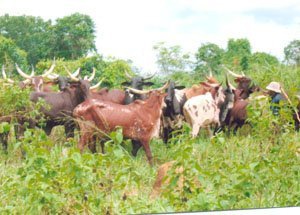The renewed clashes between indigenes and foreign cattle-herdsmen in the Agogo area of the Ashanti Region has ignited calls for the passage of the ranching law which has been in the works since 2012.
A ranching law prescribes that areas which will be utilised for breeding wild animals in captivity or semi-captivity must be fenced.
Animals, under such a law, will not be subject to the restrictions established for hunting and are declared to be the property of the breeder. Ranchers would also be required to obtain a licence from local authorities for their business.
While the Ashanti Regional Minister, Peter Anarfi Mensah, at a news conference said the Ashanti Regional Security Council (REGSEC) has deployed a combined police and security task force into the Asante Akyem town of Agogo to beef up security in the area, cattle owner believe the solution lies in a ranching law since previous attempts yielded no results.
Cattle owners have therefore called on government to expedite action on the passage of a ranching law to regulate their activities and ensure mutual co-existence between herdsmen and locals.
A ranching law was first proposed in 2012 after frequent clashes between locals and foreign cattle-herdsmen in many communities in the country and local authorities’ inability to contain livestock that stray onto the streets of various towns and villages. This raised conservation, security and safety concerns.
In 2012, a team from the Ministry of Food and Agriculture were sent to study the ranching law that Burkina Faso had successfully implemented, forcing the Fulani herdsmen to migrate down south.
The Ashanti Regional Security Council (REGSEC) in August 2012 gave recalcitrant Fulani herdsmen in Agogo a month to vacate the region or face what it called “full-scale forcible eviction”. The order was not carried through and the problem still persist today.
The decision by REGSEC in 2012 follows the setting-up of an 11-member committee in February of that year to investigate the Agogo Fulani issue, following the High Court ruling that ordered the council “to take immediate, decisive, efficacious and efficient action to flush out all cattle from Aberewapong, Mankala, Nyamebekyere, Kowereso, Adomemu, Bebuoso and Brahabebome all in the Agogo Traditional Area, the only exception being cattle that have been properly confined in a permitted area.”
Most of the local cattle owners also did not have valid titles to land for their cattle business.
Livestock -- Cattle, sheep and goat -- rearing and breeding are important contributors to food availability and income in rural communities. However, due to the benefit of rearing these animals, it is important for any applicable legal framework to take both concerns into account and strike a balance between the encouragement of these initiatives and conservation, security and local concerns.
In Burkina Faso, Ghana’s northern neighbour, both game-ranching and breeding are subject to an authorisation. Within ranches, wildlife populations are to be monitored either by the rancher or by the wildlife administration, with a view to rational management of captures.
A licence is also required in Cameroon for both game-ranches -- protected areas managed for the purpose of repopulation and possible exploitation for food or other purposes and for game-farming -- and raising of animals taken from the wild in a controlled environment for commercial purposes. In Botswana “permission” is required to farm or ranch game animals. Fencing may be required.
"Protected" and "partially protected" game animals may be farmed or ranched only under a specific authorisation. If the area is fenced, there is no limit to the number of animals of specified species which may be taken. Otherwise, culling is subject to a permit. A permit is also required for sale of animals, meat or trophies.
Though government is yet to send a delegation to Burkina Faso to study their law, stakeholders believe that with the passage of legislation to govern livestock rearing and breeding, the unfettered activities of Fulani herdsmen and individual livestock owners will be well-regulated.
General News of Friday, 5 February 2016
Source: B&FT Online













